“I’m my own super hero!” That’s what my friend Jill, also an elementary school teacher, told her students when she decided not to dress up for our school’s “Disney Princess and Superhero” spirit day.
I had just confided to Jill that I had no desire to dress up for this month’s spirit day as I was definitely not a princess, and had little interest in superheroes. Truth is, I have a much stronger opinion than that about superheroes in general, and don’t even get me started about Disney princesses!
Today, my friends, I wanted to share with you my thoughts on the superhero culture and how it may be influencing our kids on a sub-conscious level. I hope it might get you thinking about a new way to view these “innocent” cultural icons that seem to inundate our kids’ toy industry, clothing industry and even…our schools.
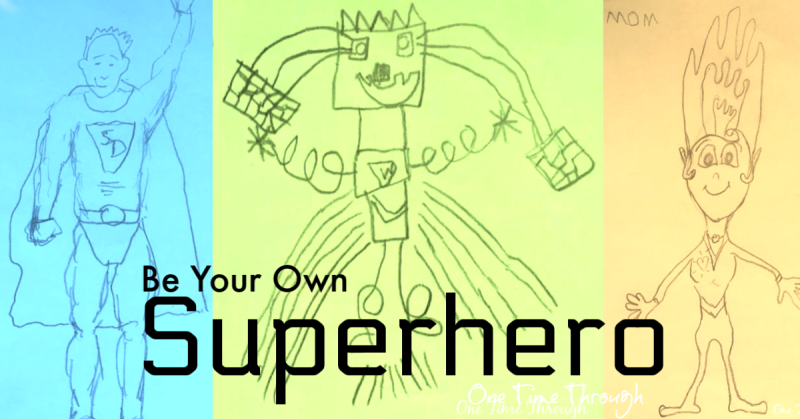
A Superhero Love Affair
Superheroes are everywhere we turn.
It seems like every time I go to see a movie there’s another trailer featuring a re-make of a Batman or Spiderman movie, not to mention all the reincarnations of the Avengers series. I had to laugh when the recent LEGO 2 movie mocked all the different actors that had played Batman alone over the last 30 years, from Adam West to Michael Keaton, Val Kilmer, Ben Affleck, Christian Bale, George Clooney and more.
There’s no doubt that these movies sell and they sell hard. People seem to have a bottomless pit to fill with endless super hero stories and there’s no sign of it slowing down any time soon.
And they inundate our kids’ culture too.
You’d be hard-pressed to find a kids’ clothing store that didn’t contain at least one super-hero t-shirt present, LEGO produces kit after kit based on the latest hero movies, half the Halloween trick or treaters this year in my neighbourhood were Batman, and my son has received numerous toys over the years from generous and well-meaning friends who only figured, “What little boy doesn’t like Spiderman?” or something similar when choosing their gift.
As a huge Sci-Fi fan in my 20s , I used to gobble up superhero movies (along with countless episodes of Xena Warrior Princess and Hercules: The Legendary Adventures. Ahhhh…Lucy Lawless and Kevin Sorbo! 👌) And with loveable, brainy TV characters like Sheldon and Leonard addicted to their comic cons, how could there possibly be a dark side to these pastimes?
But, alas, in my 20s, I was still a pretty un-enlightened gal. As much as I was gobbling up information on children, psychology and development throughout my formal studies, I didn’t think too much about how these pervasive cultural and media-generated hero models were reflecting a society addicted to black and white thinking, of judging, and of blame.
Think I’m being too harsh? Read on.
Powerful Media Messages
As an elementary school Teacher-Librarian and Media teacher, a big part of my job is teaching kids from ages 4 to 14 about the messages we get from books, movies, video games, music and even the logos on the clothing brands we buy.
The biggest challenge of my job (other than trying to keep the latest copy of Dogman on the shelf😉) is helping kids to understand that the media messages they receive can have a powerful influence on their thinking and their actions without them even knowing about it.
For example, no one can argue that the media does not affect our kids’ thinking and behaviour. As any parent who has witnessed a child watch a commercial for a toy or snack, and then ask for it to be bought knows – young children are particularly unaware of the influence of media.
There is growing evidence that children may be vulnerable as well to violence seen in TV and video games and it may impact their social behaviour towards others. Children can learn that some forms of dealing with conflict are desirable or at the very least, appropriate, from the modelling they see in from superhero cartoons and movies.
“With prolonged viewing, the world shown on television becomes the real world.”
Paediatric Child Health
Superhero Messages…Not So Super?
But what kind of messages do superheroes send our kids?
Well…there are lots of interpretations, and of course, it depends on the hero or heroine and the context of their story. But in my opinion, superhero stories send several messages that may not be palatable to you when you really start to think about it.
Messed Up Message #1: We Are Weak
First, they reinforce the concept that humans are weak and incapable of making great positive change. They tell us that we need to look outside ourselves for help. They persuade us that we either need others more powerful and special than us to save us and the world, or that we need to be imbued with special inhuman powers to fight off evil.
Unfortunately, this is just not true.
The most common way people give up their power is by thinking they don’t have any.
Alice Walker
We are each incredibly powerful beings full of an infinite capacity for love and kindness. And when we focus on making positive change, especially when we unite together in our efforts, amazing things can happen without the need for superhuman powers, and without even the need for fighting or conflict.
Sorry Batman, you can put that Batarang away.
Messed Up Message #2: We Need to Fight for Peace
And that brings me to my second beef with superheroes – they reinforce a belief that peace can only be achieved through conflict and by a more powerful force subjugating an enemy.
But that too, is just not true.
After thousands of years of war on all corners of the globe, if that were true, would we not have peace by now? Or at least be closer to it than we were a century ago?
But we aren’t. Just one night of watching the BBC or Al-Jazeera will convince you that we have not yet achieved world peace, or really even come close. As a race, humankind continues to display an incredible propensity towards hatred and destruction of those we view as “others”.
And peace cannot, and will not, ever be achieved from one person, or group of people (sorry Avengers!), exerting power over another. It can only be achieved when two groups in conflict feel they have equal power and are able to start a discussion about what they each need and how those needs can both be met.
Messed Up Message #3: Black and White Mentality
But at its core, my biggest objection to the super hero culture is that it reflects and supports our general society’s view that there are good people and bad people on this Earth.
What’s wrong with that you ask? Isn’t it true that there are amazingly kind and powerful positive influencers as well as people that do horrible, terrible things?
Well, yes. I would agree with that… in essence.
Humans in general have the capacity for great acts of love and peace…think Martin Luther King Jr., Mahatma Gandhi, Thich Nanh Hanh, and Mother Teresa to name a few. And they also have the capacity to commit great evil and spread hate and intolerance…think Hitler, Kim Jong Un, and yes, even Donald Trump.
But does it help contribute to world peace for us to think of people as intrinsically bad or evil? Does the act of classifying and labelling people, as good and bad, and then of course punishing them if they are the latter, bring more harmony to our planet?
Of course not. (Sorry Superman…)
If it did, then the approximately 10 million people currently incarcerated in jails around the world would be highly unlikely to return to jail. Unfortunately, that’s just not the way it is. In fact, most people that end up imprisoned end up back there again within 5 years, especially in the United States.
Labelling people as bad (or as an enemy) and punishing them for it, does not bring us more peace, or more love. It just brings more hurt and hate.
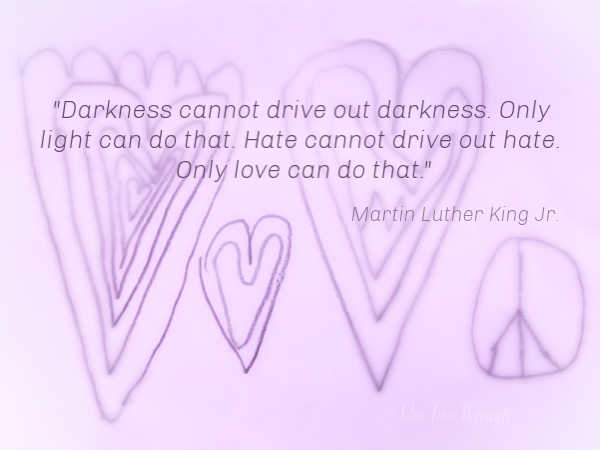
Countering the Superhero Culture
So how do we counter this culture that surrounds us and our children?
You can go hardcore and shelter your kids from super-hero movies, refuse to buy the toys, and even ban the word superhero if you want (Believe me, I’ve considered it! Lol!).
But aren’t superheroes still going to be there…everywhere?
Of course they are. They’re not going away anytime soon.
And realistically, whether we choose to shield our kids or not from the superhero culture, they will be exposed.
At the very least, I think we can talk to our kids about the message these stories send. And let our kids know that people are not good, or evil. They are just human, and part of being human is making mistakes.
Helpful Conversations
I find myself often telling my son that whatever people are doing, they are taking those actions to meet a deeper need. The actions are not always ones that benefit others, or even the person themselves, but that doesn’t make them a “bad” person. Just a person taking actions that do not meet our mutual needs.
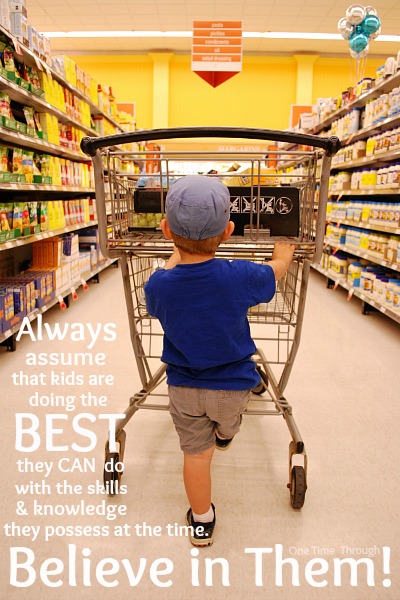
For this same reason, I don’t tell my son that he is a “good” boy (or a smart boy, or an awesome kid, you get the idea…). It is not up to me to judge and label him, or put him in a box as good (or bad).
Instead, I can let him be. Be himself. And I can share with him how his actions affect me, whether it be positively or negatively.
When he shows me kindness and love, I tell him how much I appreciate his thoughtful actions and how I feel warm inside knowing I’m so loved.
“Thank you so much for your sweet note honey. When I read it, I smile and feel so happy and loved.”
When he makes choices that end up challenging my patience, or trigger my anger, I give him the gift of knowing how his actions have affected me by telling him my feelings and what I need. That way, he can learn to make choices in the future that meet both our needs.
“When you continue to watch TV after I’ve told you it’s bedtime and asked you to turn it off, I feel angry because I need to be heard. I also need to know that I’m contributing to your well-being by helping you get the rest you need.”
Being Our Own Superheroes
Let’s return now to my friend Jill’s comment. What could be possible if we encouraged our kids to think of themselves as superheroes?
You are strong.
Instead of encouraging our kids to think that others need to save them from challenges, let’s help them understand that they have the inner strength to overcome obstacles as long as they don’t give up.
You are powerful.
Instead of encouraging our kids to think that one person needs to face down evil by himself, let’s encourage them to see the power in finding like-minded friends who can unite together to bring change.
How wonderful it is that nobody need wait a single moment before starting to improve the world.
Anne Frank
You are understanding.
Instead of encouraging our kids to see others as the enemy, let’s help them see that all people are just doing the best they can at that time with the skills and knowledge they have to meet their needs, and to have empathy for them instead of anger.
You are peaceful.
Instead of encouraging our kids to see conflict as something they need to control, fix or react to with anger, let’s teach them to grow their inner resources to respond peacefully and mindfully in any outside situation.
You are special.
Instead of encouraging kids to look outside themselves for inspiration, let’s encourage them to look inside to see their own inner gifts.
You are kind.
Instead of encouraging our kids to think that they need super-human powers to make big changes, we can help empower them to make small changes that can ripple out to bring the change they want to see.
The kindness we extend to others ripples out into the universe endlessly.
Calvin Malone
Visualizing Your Superhero Self
Why not ask your children what super powers they would like to develop in themselves?
My husband, son and I chatted about this and decided to draw pictures of ourselves as superheroes. We each picked two “powers” we wanted and added them into our drawings.
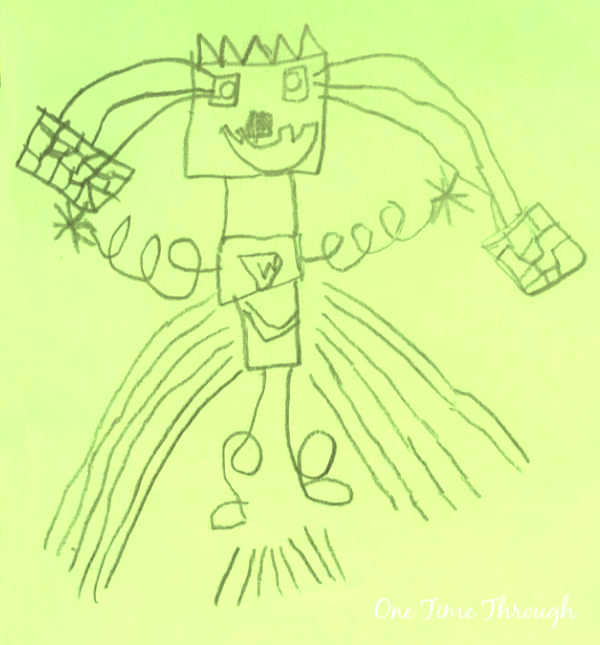
My son saw himself as a superhero who could fly wherever he wanted (including to the “centre of the universe”) and which would shoot Minecraft blocks from his eyes to make things just with his thoughts.
It was really interesting to see my son’s desire for travel (right now he wants to be an astronaut when he grows up) as well as a need to create and make things. All powers that I can help encourage!
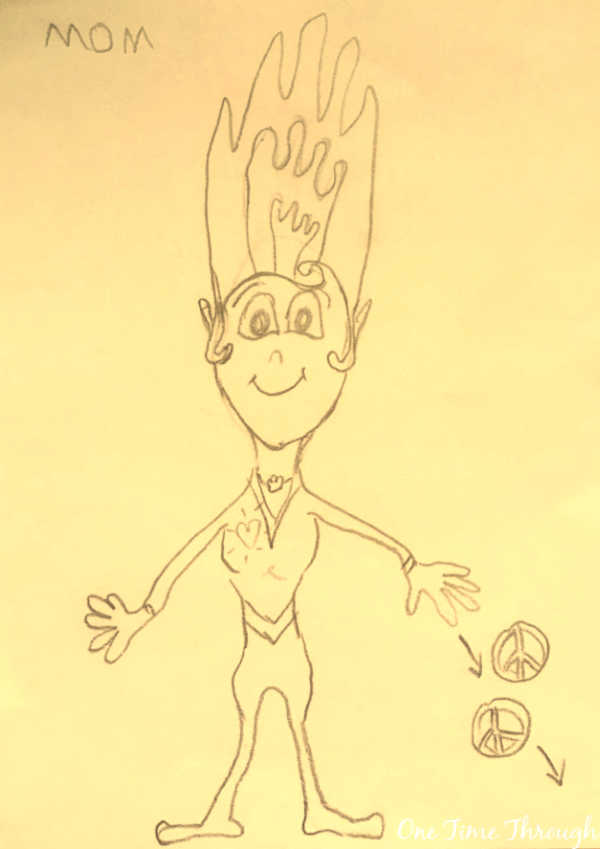
I picture myself as a candle that can ignite a passion for peace in those around me. I hope that I am doing that through this blog and sharing my views on raising kids without punishments and rewards with others.
And my husband, who received a kidney transplant late last year that saved his life, views himself as being healthy, strong and invincible with the ability to fly. No surprises there after being unable to travel due to kidney dialysis last year!
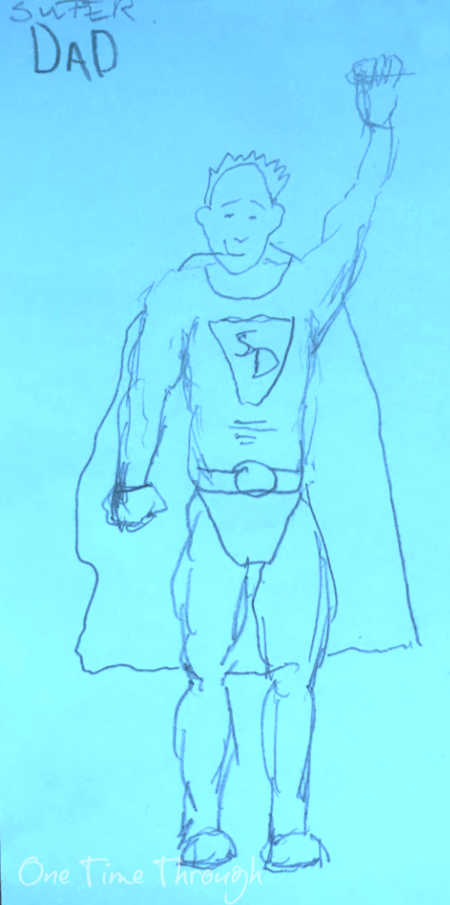
None of these things are out of our reach. We can be our own superheroes for ourselves and others. It’s possible. We just have to believe it and focus on it with all our intentions and love.
To your inner superhero and to your child’s as well!
Much love,

Check Out This Great “Superhero” Read!
Nominated as one of the 10 best picture books by a Canadian author for 2018 by the Forest of Reading, my students really enjoyed this story and had fun thinking of their own super powers after!
To find even more fun and educational activities as well as positive parenting tips, follow me on Facebook, and Pinterest.


Incredibly though-provoking!
I don’t agree with every single thing, but that’s a fun and inspiring way to feel (what DO I think about this stuff??) — and I love the wisdom and depth here.
Thanks and love,
Full Spectrum Mama
Great message until you went to the whacko political zone- yes, comparing President Trump to Hitler makes you sound like a whacko.